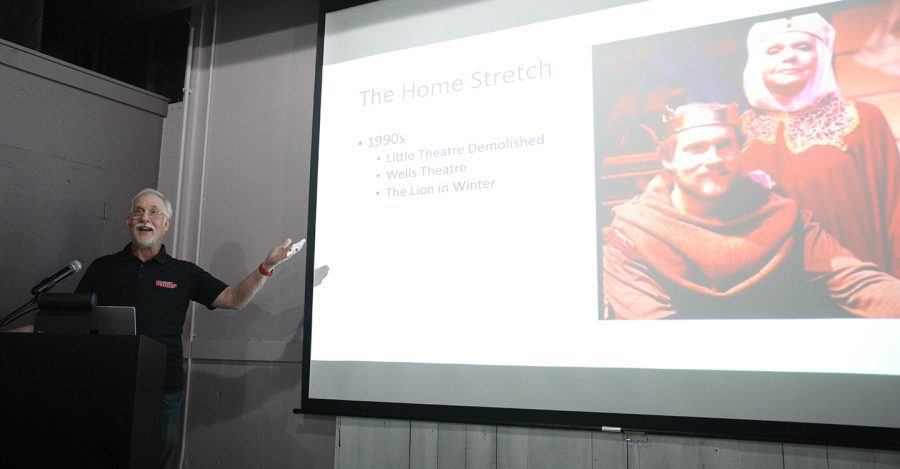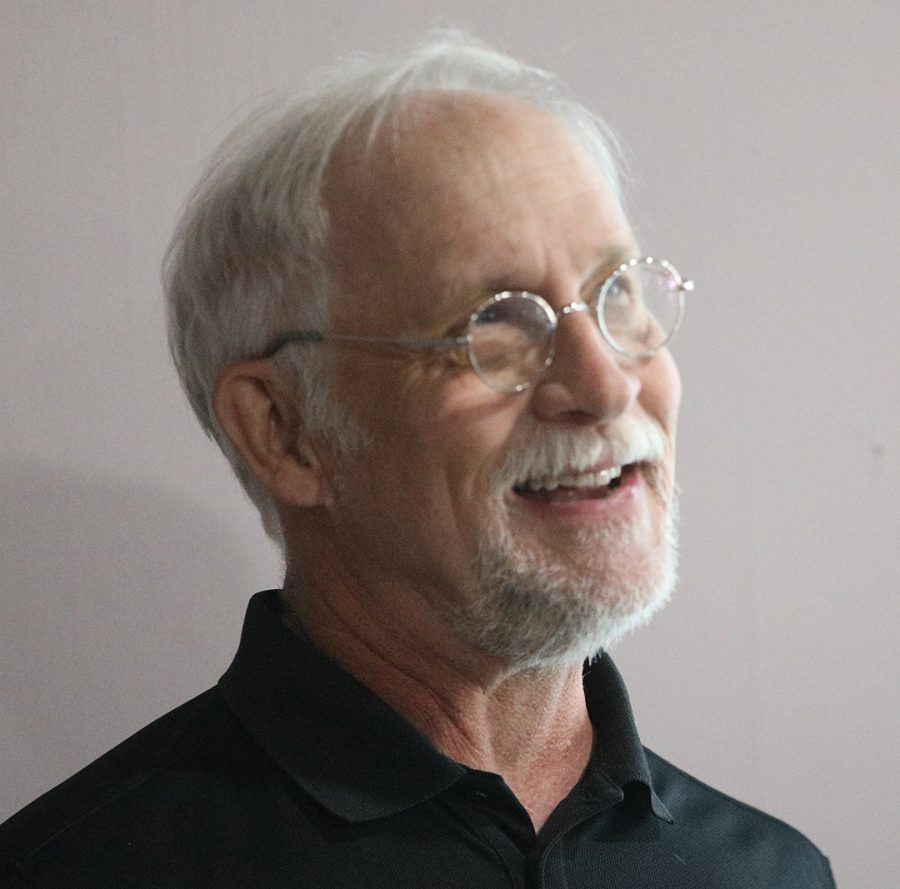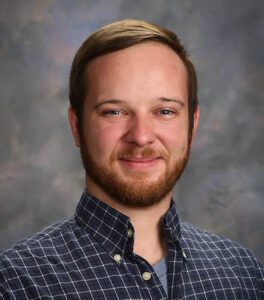“Pass the parcel. That’s sometimes all you can do. Take it, feel it, and pass it on. Not for me, not for you, but for someone, somewhere, one day. Pass it on, boys. That’s the game I wanted you to learn. Pass it on.” – Hector, from the Allen Bennett play “The History Boys”
“The finest and most talented theatre student” that Monmouth College emeritus professor Jim De Young ever had has now become an emeritus professor himself.

Doug Rankin has retired from teaching at his alma mater after 32 years, although his connection to the College goes back to the late 1950s, growing up as one of the twin sons of the late Monmouth administrator Glen Rankin ’43. It continued throughout the 1960s until 1975, when Rankin made the connection even stronger, enrolling as a freshman.
“He began his work with me while still in high school,” said De Young, who taught theatre at Monmouth from 1963-2002. “That he returned to his alma mater to make his teaching career here made him a treasured colleague. His presence at Monmouth College has been a gift that has kept on giving. Professor Doug Rankin certainly passed the parcel.”
‘Musings of a Faculty Brat’
During his appearance at the May meeting of Monmouth Associates, Rankin spoke on “Musings of a Faculty Brat.” While recalling the advantages of growing up around a college campus, he said it was a play directed by De Young in the late 1960s that sparked his interest in theatre – an interest that became a hobby, his academic focus and, eventually, his career.
Rankin was 11 years old when the College staged a memorable production of a children’s story in its former space, The Little Theater.
“I caught the theatre bug in 1969,” said Rankin. “The College put on Reynard the Fox, and it was just magic. I went to every single performance.”
By the time he assisted a year or so later with a production at Monmouth High School, the theatre hook was firmly set.
“They put on The Curse of an Aching Heart, and I got to do sound and stage design for it,” said Rankin. “It got me really involved in theatre and really started the ball rolling.”
Rankin took advantage of his higher education ties to get the college experience while still a student at MHS. In addition to helping De Young with theatre productions, he and another high school student enrolled in a psychology class, where his ability to step up to a challenge was proven.
“We took Psych 101 with Dean Wright, who was an outstanding professor,” said Rankin. “Early on, I remember that he came up to the two of us and suggested that it might be a little too hard for us and that we might want to drop the class. But by the end of the semester, we were the only two students who got an A.”
Rankin was learning important lessons all over campus in those days, working first in the dish room of the cafeteria, and then with the “Green Army,” the wardrobe-influenced nickname of the College’s physical plant staff.
“They were all older guys and a lot of them were World War II vets,” said Rankin. “I learned plenty from them. We’d take coffee breaks, and they’d sit around telling stories. It’s also where I learned the (building) trade. That was a very influential summer.”
His college years, 1975-79
Rankin’s work ethic and involvement continued once he enrolled at Monmouth. In addition to emerging as a star theatre pupil, he was an active member of Zeta Beta Tau – forging a lifelong friendship with the chapter’s beloved adviser, the late Richard “Doc” Kieft – and edited The Oracle, Monmouth’s student newspaper.
“Every week, I’d have to drive the paper to the middle of Iowa in the middle of the night to be printed,” he said. “Then I’d come back in the morning for a Shakespeare class with Professor (Jeremy) McNamara. There were only four people in the class. I was the one sleeping.”
Despite that minor speed bump, Rankin graduated with departmental honors with a major in speech/communication/arts. He eventually headed to Northwestern University, where he earned a master’s degree in scenery, lighting and costume design.
He has used that expertise on hundreds of productions throughout the Midwest, and his scenery designs include two for Tony Award-winning director Frank Galati.
Rankin’s Associates talk took him up to a major moment in his department in 1990, when the College held the first production in its new Wells Theater. In addition to designing the scene shop for the new facility, Rankin was cast in a starring role opposite 1938 Monmouth graduate Helen Wagner Willey, the acclaimed matriarch on the soap opera As the World Turns, in the theatre-opening production of The Lion in Winter.
“That was a wonderful experience,” he said. “We played a husband and wife, even though I was 33 and she was 72. Then, in the other productions after she left, my wife was played by an 18-year-old. … That really started the ball rolling for the new theatre, and the last 30 years have just been a blur.”
A jack of many trades
Rankin was asked to bring those three decades on Monmouth’s faculty into a little sharper focus, which he did, in part, by recalling some special sets he designed and some memorable productions he directed.
“The Sweeney Todd set stands out,” he said. “It was all done in steel. There was so much welding. It was built like a Broadway set. And I loved the Oliver! set. It was two stories, and it had a bridge. It was very time-consuming, but I felt really good about how it turned out.”
Those sets were for a pair of musicals. One production Rankin directed that was decidedly non-musical was The Pitchfork Disney.
“That was totally bizarre, and it scared everybody,” he said, including, as Rankin recalled, the College’s dean at the time, David Timmerman.
“One of the first shows I directed was Dark of the Moon, which I’d seen years before at The Little Theater,” he said. “It was a very folkloric thing with witchcraft in the Appalachian Mountains. And another of my favorites was The Wolves. We brought in a couple of Monmouth soccer players to help the rest of the cast with their skills.”
Another memory from the past three decades was annually attending the regional Kennedy Center American College Theater Festival. In addition to taking students to compete at the event, Rankin served for five years as co-chair of the festival’s Design, Technology and Management Committee.
Over the years, a pair of Monmouth students – Natalie Curtis ’18 and Amanda Green ’20 – did well enough in the design competition to receive a scholarship to participate in an intensive, professional workshop in Las Vegas.
In his retirement, Rankin will put his considerable building trade talents to work on historic area homes. He’s been restoring his 1882 Queen Anne home for more than 30 years and is now fielding multiple calls to tend to Monmouth and Galesburg residences.
“People have a hard time finding someone who can do multiple parts of a project – the carpentry, electrical work, painting and plumbing,” he said.
Fortunately for those people, Rankin is a jack of all those trades.
“I’ll probably be busier than I was when I was working here,” he said. “Here, I would have just one play at a time to worry about. Now, it’ll be like working on 10 plays at a time.”
Rankin was asked to pass along advice to someone who might just be getting started as a college professor.
“Focus on what you like, and try to make that your special talent,” he said. “Focus on what really floats your boat, and don’t be afraid to try to do things in a slightly different way.”
When he was starting out, Rankin learned from De Young how to discern the arc of each scene, as well as how to tie the scenes together, perhaps through the use of a metaphor. He also learned from his father about the privilege of working at Monmouth College.
“It was my destiny to try to continue on after him at Monmouth,” said Rankin. “It’s been an honor.”
***Courtesy of Barry McNamara, Monmouth College***
















